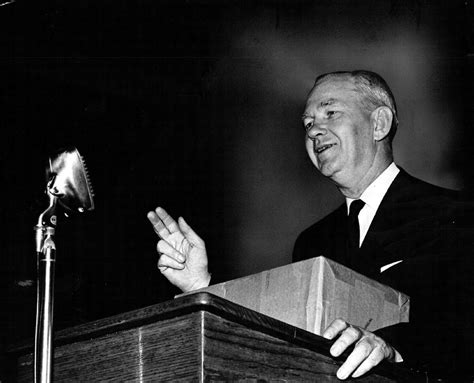A Quote by John Stuart Mill
A general State education is a mere contrivance for moulding people to be exactly like one another, and as the mould in which it casts them is that which pleases the dominant power in the government.
Related Quotes
?A general State education is a mere contrivance for moulding people to be exactly like one another; and as the mould in which it casts them is that which pleases the dominant power in the government, whether this be a monarch, an aristocracy, or a majority of the existing generation; in proportion as it is efficient and successful, it establishes a despotism over the mind, leading by a natural tendency to one over the body.
I believe each individual is naturally entitled to do as he pleases with himself and the fruit of his labor, so far as it in no wise interferes with any other mans rightsthat each community, as a State, has a right to do exactly as it pleases with all the concerns within that State that interfere with the right of no other State, and that the general government, upon principle, has no right to interfere with anything other than that general class of things that does concern the whole.
Government power must be dispersed. If government is to exercise power, better in the county than in the state, better in the state than in Washington. If I do not like what my local community does, be it in sewage disposal, or zoning, or schools, I can move to another local community, and though few may take this step, the mere possibility acts as a check. If I do not like what Washington imposes, I have few alternatives in this world of jealous nations.
The breakdown of Plato's philosophy is made apparent in the fact that he could not trust to gradual improvements in education to bring about a better society which should then improve education, and so on indefinitely. Correct education could not come into existence until an ideal state existed, and after that education would be devoted simply to its conservation. For the existence of this state he was obliged to trust to some happy accident by which philosophic wisdom should happen to coincide with possession of ruling power in the state.
The error of Socrates must be attributed to the false notion of unity from which he starts. Unity there should be, both of the family and of the state, but in some respects only. For there is a point at which a state may attain such a degree of unity as to be no longer a state, or at which, without actually ceasing to exist, it will become an inferior state, like harmony passing into unison, or rhythm which has been reduced to a single foot. The state, as I was saying, is a plurality which should be united and made into a community by education
Education, and the life of the mind generally, is a matter in which individual initiative is the chief thing needed; the function of the state should begin and end with insistence on some kind of education, and, if possible, a kind which promotes mental individualism, not a kind which happens to conform to the prejudices of government officials.
It is unfortunately none too well understood that, just as the State has no money of its own, so it has no power of its own. All the power it has is what society gives it, plus what it confiscates from time to time on one pretext or another, there is no other source from which State power can be drawn. Therefore every assumption of State power, whether by gift or seizure leaves society with so much less power; there is never, nor can be, any strengthening of State power without a corresponding and roughly equivalent depletion of social power.
Society in every state is a blessing, but government even in its best state is but a necessary evil; in its worst state an intolerable one; for when we suffer, or are exposed to the same miseries by a government, which we might expect in a country without government, our calamity is heightened by reflecting that we furnish the means by which we suffer.
We have two distinct types of political organization to take into account; and clearly, too, when their origins are considered, it is impossible to make out that the one is a mere perversion of the other. Therefore when we include both types under a general term like government, we get into logical difficulties; difficulties of which most writers on the subject have been more or less vaguely aware, but which, until within the last half-century, none of them has tried to resolve.
A constitution founded on these principles introduces knowledge among the people, and inspires them with a conscious dignity becoming freemen; a general emulation takes place, which causes good humor, sociability, good manners, and good morals to be general. That elevation of sentiment inspired by such a government, makes the common people brave and enterprising. That ambition which is inspired by it makes them sober, industrious, and frugal.
THE Constitution proposed by the convention may be considered under two general points of view. The FIRST relates to the sum or quantity of power which it vests in the government, including the restraints imposed on the States. The SECOND, to the particular structure of the government, and the distribution of this power among its branches.
Being the dependents of the general government, and looking to its treasury as the source of all their emoluments, the state officers, under whatever names they might pass and by whatever forms their duties might be prescribed, would in effect be the mere stipendiaries and instruments of the central power.






































